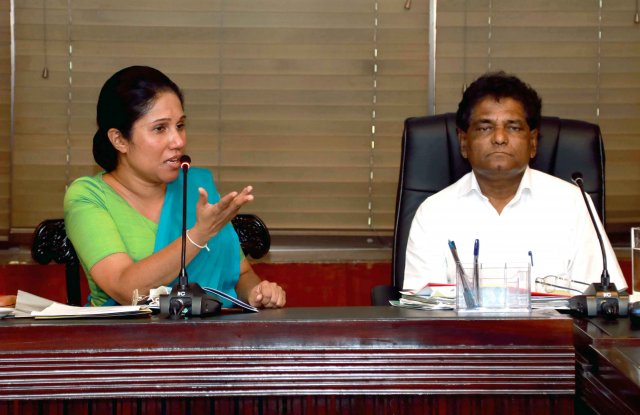
Under the guidance of Minister Sita Arambepola, the research institutes under the Ministry of Science and Technology have come forward to find solutions to the social problems faced by the general public through scientific research knowledge. Accordingly, discussions were held on the sustainable application of practical scientific solutions to the human-elephant conflict. The Sri Lanka Inventors Commission, National Institute of Fundamental Studies, Industrial Technology Institute, Sri Lanka Institute of Nanotechnology, which are functioning under the State Ministry of Skills Development, Vocational Education, Research and Innovation, are already conducting a number of researches in this regard. Successful pilot tests have also been conducted on several occasions. In the future, this research will be further expanded to provide scientific solutions to this problem. Technical support will be sought from the Arthur C. Clark Institute for Modern Technologies and the National Engineering Research and Development Center.
It was stated that the main reason for the arrival of wild elephant to villages is the lack of adequate food and water and if a mechanism is set up for this purpose, they can be confined to wildlife boundaries and thus about 50% of the problem will be solved. The Inventors' Commission and the National Institute of Fundamental Studies are conducting research on the restoration of the Kulu tanks in the forest, the restoration of the old system of feeding the Great Lakes through the Kulu tanks, and the identification and cultivation of fast-growing native grasses to feed the elephants.
Invention supported by the Inventors' Commission, Karuwalagaswewa has developed a high-efficiency hanging fence, an improved fence post that cannot be destroyed by an elephant, and a collar system that provides special signals that can worn the violently damaging elephants. It has also conducted pilot tests in Udawalawe and Ampara. A successful drone technology application has also been developed with the assistance of the Railway Department under the guidance of Mr. Manju Gunawardena to prevent collisions of wild elephants with trains. The Industrial Technology Institute is implementing a communication based project to ensure the safety of the community from wild elephant attacks.
Speaking at the event, Minister Dr. (Mrs.) Sita Arambepola said that it would be easier for the State Ministries of Technology and Innovation, Wildlife, the Wildlife Department, the Forest Department and the Irrigation Department to work together to resolve this issue. She also pointed out that a mechanism should be set up expeditiously to identify areas that should be given priority in finding solutions to this social problem and to implement pilot projects.
Minister of State Ministry of Wild Life, Mr. Wimalaweera Dissanayake stated that efforts are being made to find a solution to a burning issue by resolving financial and legal issues and that he believes that successful results can be achieved through a collective effort.
Secretary to the Ministry of Skills Development, Vocational Education, Research and Innovation, Mr. N. H. M. Chithrananda, Heads of affiliated institutions, officials of wildlife protection and conservation of the Ministry of Wildlife were also present.






